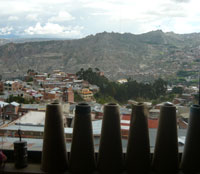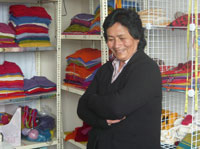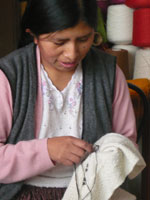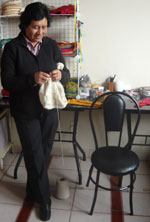 One rainy March afternoon we visited Doña Celia's workshop located in Villa Armonía, one of the areas affected by landslides recently caused by seasonal heavy rains. Luckily, the disaster did not affect the area where this skilled artisan's home and workplace are located. She tells us her story:
One rainy March afternoon we visited Doña Celia's workshop located in Villa Armonía, one of the areas affected by landslides recently caused by seasonal heavy rains. Luckily, the disaster did not affect the area where this skilled artisan's home and workplace are located. She tells us her story:
“As you can see, the workshop is orderly and clean, which is how we always keep it. All my knitters are in El Alto in the Tahuantinsuyo neighborhood except for 2 who live near here, although I cannot count on them now because of the problems with the landslides.
 "Actually, the workshop is only the collection site. I've been working with five knitters for about 11 years. Each works in her home so that she can take care of her children. A woman comes in to work here only when we get really big orders. Everything done by hand (knitting needles) is done by me. I also do designs unless the client already has his/her own. When I receive the sample, I knit it by hand so that it is an exact match, with the same number of stitches and size so that I can give it to the knitters to reproduce. Here in the workshop, we add buttons, do embroidery and finishing, ironing, sewing in labels, instructions, packaging, etc. Almost all my products are handmade, which is why they are a little expensive.
"Actually, the workshop is only the collection site. I've been working with five knitters for about 11 years. Each works in her home so that she can take care of her children. A woman comes in to work here only when we get really big orders. Everything done by hand (knitting needles) is done by me. I also do designs unless the client already has his/her own. When I receive the sample, I knit it by hand so that it is an exact match, with the same number of stitches and size so that I can give it to the knitters to reproduce. Here in the workshop, we add buttons, do embroidery and finishing, ironing, sewing in labels, instructions, packaging, etc. Almost all my products are handmade, which is why they are a little expensive.
 "We get together with the artisans every three months at their homes to check the hand work, give them new garments to reproduce and to pay them (leave, pay and collect). Some artisans are quick and others are a bit slower. Once a year I give them aprons so that they can keep their knitting clean because when their garments get dirty they have to be washed and the quality suffers - they look used. Therefore, when I get the garments I check them (I look at them and smell them) from top to bottom. Then I iron them with a damp cloth to shape them so that they are not stretched.
"We get together with the artisans every three months at their homes to check the hand work, give them new garments to reproduce and to pay them (leave, pay and collect). Some artisans are quick and others are a bit slower. Once a year I give them aprons so that they can keep their knitting clean because when their garments get dirty they have to be washed and the quality suffers - they look used. Therefore, when I get the garments I check them (I look at them and smell them) from top to bottom. Then I iron them with a damp cloth to shape them so that they are not stretched.
"I work with Ayni, Ciudad Bebe and other customers. I also worked for German customers. I have regular customers. I opened a shop in San Miguel (business center in the richest neighborhood of La Paz), but it didn't do well - no sales. I also had my shop in Linares (La Paz artisan street) where I sold pretty well, but I closed it because a thief got in and cleaned out the store. I lost 9,000 dollars there, and the shop went under. Then, neither my husband nor my children wanted to go back to knitting, but when I saw the colors I felt bad; I wanted to knit so much that I got depressed. But, thanks to the workshop and my customers I was able to start knitting again. Knitting is my passion and my source of income.
 "My two greatest supports when I am knitting are my daughter and my ex-maid whom I raised from the time she was 14 and taught to knit. Now she lives in El Alto and works from there. When I get big orders, she comes to help me and sleeps here.
"My two greatest supports when I am knitting are my daughter and my ex-maid whom I raised from the time she was 14 and taught to knit. Now she lives in El Alto and works from there. When I get big orders, she comes to help me and sleeps here.
"Well sell year round, with God's blessing. The busiest seasons are May through December. The slower months (January, February, March, April) I earn between 1500 to 2000 Bs per month (166 to 222 Euros), and in the busy season (May, June, July, August, September, October, November and December) I earn between 3000 and 5000 Bs. (333 to 555 Euros) per month.
"My mother was an artisan and taught me to knit. I also studied to be a teacher.
"This is my house. From the window you can see the patio with an apple tree. I live here with my tenants, two of my four children and their families.
"I have visited several fairs, including one in Colombia. Caserita found me at the Kipus fair. Then Giovi came to see me and asked me to work with her. I've been working with Caserita for five years now."
See the products of this artisan


